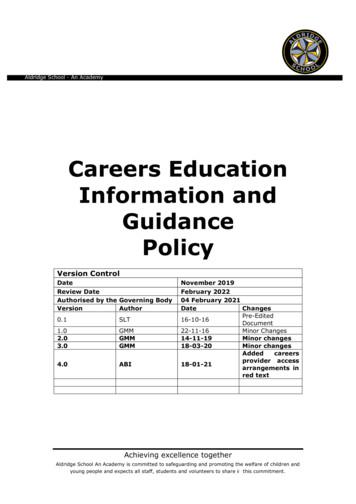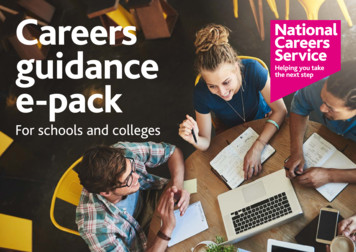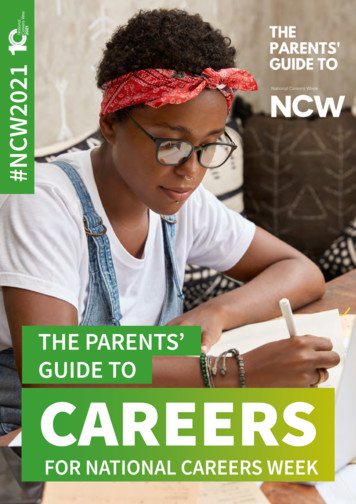CAREERS POLICY - Way Fresh
CAREERS POLICYAuthor’s NameE McDermott, Assistant Vice Principal / CareersLeaderDate WrittenMay 2019Review DateAcademic Year 2019/2020Date Ratified byGoverning Body5th July 2019SIGNATURES:PrincipalMrs J. S. BridgesChair of GovernorsMrs H. Mottram1
IntroductionThe Academy has a statutory duty to secure independent careers guidance for all year 7 to 11 students(The Education Act 2011 / Careers guidance and access for education and training providers Jan 2018)and to meet the eight Gatsby Benchmarks for Good Career Guidance by 2020.Our aim at Castle View Enterprise Academy is for all students to achieve their personal best. In careerseducation, this translates as every student making the right choices for progression. We will supportstudents in making well-informed decisions by providing access to differentiated, impartial, independentinformation and guidance about the range of options (including academic, vocational, andapprenticeships) that are most likely to help them to achieve their ambitions.AimsCareers at CVEA will: provide good quality independent careers advice to students which inspires them and motivatesthem to fulfil their potential;provide personal advice and guidance which is in the best interests of, and meets the needs of,all students;be based on the Gatsby Benchmarks for Good Careers Guidance;contribute to the raising of student achievement by encouraging students to develop highaspirations and consider a broad and ambitious range of careers;provide opportunities to work in partnership with employers, training providers, local colleges andothers;provide opportunities to inspire students through real-life contact with the world of work;develop enterprise and employability skills including skills for self-employment;support inclusion, challenge stereotyping and promote equality of opportunity;encourage students to see career development as a life-long process;develop students’ skills and knowledge of careers including career management skills andknowledge of the local labour market (LMI);ensure students are aware of the full range of academic and technical routes available at eachtransition point so that students have the necessary knowledge to make successful transitions;provide opportunities for meaningful encounters with employees, employers, further and highereducation and experience of workplaces;support social mobility by improving opportunities for all students andbe weaved and embedded into subjects across the curriculum.CommitmentThe aim of our careers provision is to raise our students’ aspirations; to broaden their horizons; to inspireand to empower them to make informed, realistic decisions at key transition points in learning and work.The Academy has a statutory duty to ensure that all students are provided with independent careersguidance from year 7 to year 11. This independent guidance includes employer talks, mentoring, andaccess to online and telephone support.Personal guidance is provided by the Careers Leader (who is a registered careers professional (CDIProfessional Register) who has a L6 Diploma in Careers Guidance and Development and by an externalcommissioned service (matrix accredited). The Careers Leader engages in a minimum of 25 hours ofCPD and abides by the CDI Code of Ethics. Additional careers guidance is provided by Connexions fortargeted students.2
Careers advice is presented in an impartial manner, showing no favouritism towards a particularinstitution, pathway, or work option. The advice provided covers the full range of education and trainingoptions, including apprenticeships and technical routes. The guidance promotes the best interests of thestudent.The Academy is committed to providing a stable, structured and planned programme of advice andguidance with clear student outcomes. This is based on the Gatsby Benchmarks for Good CareerGuidance (Appendix A) and the CDI Framework for Careers, Enterprise and Employability Education.This is differentiated to suit the needs of each individual student.Each student is entitled to: independent and impartial careers guidance;access to external sources of information on the full range of education and training options;a stable programme of advice and guidance delivered by individuals with the appropriate skills,experience and qualifications;opportunities to engage with a range of employers, education and training providers, covering thefull range of academic and technical routes available at each transition point;at least one meaningful encounter with an employee or employer each academic year (at leastone of which will be STEM employers);have access to good quality LMI and be supported to use this data to inform their decisions;at least one careers interview by the age of 16 with a L6 career professional andat least one experience of a workplace by the age of 16.The Academy abides by the Inspiring IAG Code of Practice (Appendix B) and is committed to gaining theQuality in Careers Standard.ImplementationManagementThe Careers Leader, Emma McDermott, has overall responsibility for all aspects of the CEIAGprogramme.Roles and ResponsibilitiesThere is a careers team of key staff who each have specific roles:Mrs Emma McDermott, Assistant Vice Principal;Careers Leaderresponsible for the provision and monitoring ofa planned CEIAG programme.Miss Emma Sell, PSCHE co-ordinator;responsible for the delivery of CEIAG through thePSCHE curriculum.The Careers Leader is supported by a Careers Administrator.A designated governor, Mr Aaron Young, has responsibility for overseeing the quality of careersguidance and supporting employer engagement.The Academy is supported on a strategic level by an Enterprise Advisor.All Academy staff contribute to careers through their roles as tutors and subject teachers.For further information on careers roles and responsibilities please see Appendix C.3
Connexions provides additional careers guidance interviews and one to one support for targetedstudents. The Academy works with the Local Authority and a range of voluntary / statutory agencies toidentify and support students who are in need of targeted support and those at risk of not participatingpost-16. This includes students with particular vulnerabilities or who are receiving support to safeguardthem and promote their welfare such as Children in Need. It also includes students with additionalneeds, such as special educational needs and disabilities and those who may leave care between theages of 16 and 18.External partnershipsThe Academy works with a range of local employers, education and training providers to provideindependent advice to students.This provision includes: careers fairs; work experience (for all year 10 students); workshops; career insight talks; mentoring; collapsed timetable days; STEM Inspiration Day and events; workplace visits; visits to FE and HE institutions; Industrial Cadet programmes (Unipres and Nissan); Building My Skills; Work Discovery; curriculum projects and National Careers Week.The Academy provides opportunities for a range of education and training providers to access allstudents in years 8 to 11 for the purpose of informing them about approved technical educationalqualifications or apprenticeships. The Academy has a published policy statement setting outarrangements for provider access. This is available on the Academy website.Working with external partners, the Academy fulfils the requirement for all students from year 7 to year11 to have at least one meaningful encounter each academic year with an employer and for all studentsto have experience of at least one workplace by the age of 16.The Academy actively promotes parent / carer involvement through careers events, parental newsletters,the Academy website, careers support at parental evenings and the offer of parental attendance atstudents’ individual guidance sessions.ResourcesThe budget for careers is allocated on an annual basis. Additional resources can be requested.The Careers Leader has responsibility for the management and deployment of the careers budget andcareers resources.Staff developmentTraining needs are identified through performance management, staff appraisals, line manager meetingsand Careers Champion meetings. CPD is offered to relevant staff as opportunities arise. Informationfrom CPD sessions is disseminated to staff through Careers Champion meetings and the Academy CPDprogramme. Staff attend local and regional careers network meetings to share good practice with otherlocal secondary schools and careers providers. Staff development is monitored by line managers.4
CurriculumThe Academy delivers careers education through a combination of methods: Careers units in key stage 3 enterprise lessons;Tutorial programmes for all year groups;Collapsed timetable days focusing on employability and enterprise skills;Extra-curricular activities and enrichment events (including career talks, workplace visits, guestspeakers, work placements, mentoring, college and university visits, motivational speakers;)Work experience programme (year 10);Careers assemblies;Annual careers fair;Workshops;Workplace visits, FE and HE visits;NECOP activities (targeted and whole year group);Building My Skills careers management programme (led by local businesses) (year 10);Careers library based in the Learning Resource Centre (resources are relevant and updated on aregular basis);National Careers Service website and remote assemblies;DWP School Advisor support (assemblies and workshops);ASK Apprenticeship programme (assemblies and workshops);Individual careers guidance sessions with a qualified careers professional in year 11 for allstudents (identified students receive additional careers guidance sessions and support prior toyear 11. In addition, students (years 7 -11) can request a careers guidance session;Creating a learning environment which allows and encourages students to tackle real-lifechallenges andEmployer based curriculum projects / challenges.More details of the careers programme are published on the Academy website.AssessmentCareers learning is assessed using the learning outcomes from the CDI Framework for Careers,Enterprise and Employability Education. Student progress and the quality of work is assessed through arange of assessment methods including self-assessment, peer assessment, self-evaluation and teacherassessment.Monitoring and evaluationThe Academy careers programme is delivered through PSCHE lessons, the tutorial programme, withincurriculum areas as well as through an extensive range of enrichment opportunities and activities. Ourmonitoring and evaluation strategies encompass all of these aspects of delivery.This regular and systematic monitoring and evaluation is used to inform decision making about futuredevelopment of the careers programme.Monitoring activities used to ensure that the careers programme is being implemented as plannedinclude: Learning walks Lesson observations Questionnaires – students, staff, parents and carers, external partners Focus groups – students and staff Career participation tracker5
Work scrutinyCurriculum plansDestination dataEvaluation activities are used to measure the impact of our career programme and inform futureplanning. Evaluation activities include: Analysis of destination data Career participation dashboard Activity survey Destination data – sustained data (DFE), CVEA data Learning walks Lesson observations Questionnaires – students, staff, parents and carers, external partners Focus groups – students, staff, Careers Champions Student evaluations of personal guidance interviewsThe effectiveness of our careers guidance will be reflected in the higher numbers of studentsprogressing to positive destinations such as apprenticeships, technical routes, sixth form colleges,further education colleges, universities or employment. Destination data (Dfe) is used to assess howsuccessfully students make the transition into the next stage of education or training, or into employmentand to inform future careers provision.Evaluation of the careers programme is shared in a termly report to SLT and Governors and with parents/ carers and other stakeholders through the Academy website and newsletter.The careers policy is reviewed on an annual basis by the Careers Leader.Links with other policiesThis policy supports and is underpinned by key Academy policies including those for Teaching andLearning, PSCHE, Equal Opportunities and Diversity, Gifted and Talented, Provider Access, WorkExperience and SEND.6
APPENDIX A7
8
APPENDIX B1. Ensure young people get the support they need to make well informed, realisticdecisions about their future through careers education, information, advice andguidance.2. Have appropriate, up to date, accurate and impartial information and resourcesthat all young people can access regardless of race, gender, religion, ability,disability, social background or sexual orientation.3. Ensure the organisational policies relating to careers education, information, adviceand guidance (CEIAG) are up to date and regularly reviewed and reflect this codeof practice.4. Empower young people by informing them of how they can access CEIAG to helpthem plan their future and make well informed, realistic decisions.5. Provide young people from year 8 onwards access to impartial professionallyqualified careers guidance1 and ensure formal regular assessment arrangementsare carried out of the guidance practitioner, by appropriately qualified2 senior staffto determine ongoing competency.6. Offer all young people access to impartial and independent3 careers guidance4, ata time and place that suits their needs.7. Ensure that all staff working with young people are offered and access ongoingtraining about qualifications/progression pathways and other relevant subjects andthat there is a formal system in place to ensure the competency of all staff indelive
Careers learning is assessed using the learning outcomes from the CDI Framework for Careers, Enterprise and Employability Education. Student progress and the quality of work is assessed through a range of assessment methods including self-assessment, peer assessment, self-evaluation and teacher assessment. Monitoring and evaluation The Academy careers programme is delivered through PSCHE .
Careers & Enterprise Company: Guide for new Careers Leaders in schools. Essential information, helpful resources and practical tools to help newly appointed Careers Leaders get started in the role. National Careers Service. The National Careers Service provides information, advice and guidance to help people make decisions on learning, training and work opportunities. The service .
careers that relate to the environmental goal defined on their worksheet. Students can search for related careers by keyword, subject area, or cluster. (If they need help identifying careers that fit their assigned goal, they can find the example careers in the program and look in the Related Careers section for inspiration.)
The concept of careers and career-related learning in the primary school phase typically provokes a cautious reaction. Terms such as 'careers learning', 'careers education' or 'careers lessons' are often conflated with careers guidance which is often understood to be focused on careers choice. Many parents and teachers have concerns
information or ask the careers advisor a careers related question or enquiry. The careers advisor will arrange to attend visits to employers, Further and higher Education institutions, training providers and related Careers Conferences and workshops to support LMI knowledge and keep up-to
Careers in Context: A can-do guide careersandenterprise.co.uk 4. Practical resource and support: 1. Use the Teach First four-step process for creating a strategic careers plan. To learn more about this, complete the free ‘Introduction to Careers Leadership’ online training 2. Read the Cheadle Hulme Case Study to see how a school has aligned their strategic career plans to wider school .
Our e-pack of careers guidance resources will help you deliver impartial careers information, advice and guidance in line with your statutory guidance duties and help you work towards several of the Gatsby Benchmarks. This pack is designed to add value to your existing careers provision and give you time-saving tools and resources to help you effectively and efficiently plan careers lessons .
The Parents’ Guide to Careers for National Careers Week 2021 The Parents’ Guide to Careers for National Careers Week 2021 Page 22 www.theparentsguideto.co.uk Where to find the right apprenticeship There’s a wide range of ways to seek out apprenticeships and we recommend using a selection of options rather than relying on one. Government website Most apprenticeships are posted on the .
RUMINANT ANIMAL NUTRITION ANN 503 BY Prof. C. F. I. Onwuka Dr. O.A.Isah *Dr. A.O. Oni Dr(Mrs) R.Y. Aderinboye *Course coordinator. COURSE OUTLINE Course introduction , preview and expectation The Nature of ruminant Stomach Physiology, microbiology and biochemistry of rumen Utilization of roughages in ruminant feeding The use of agro industrial by-products in ruminant feeding Importance and .























